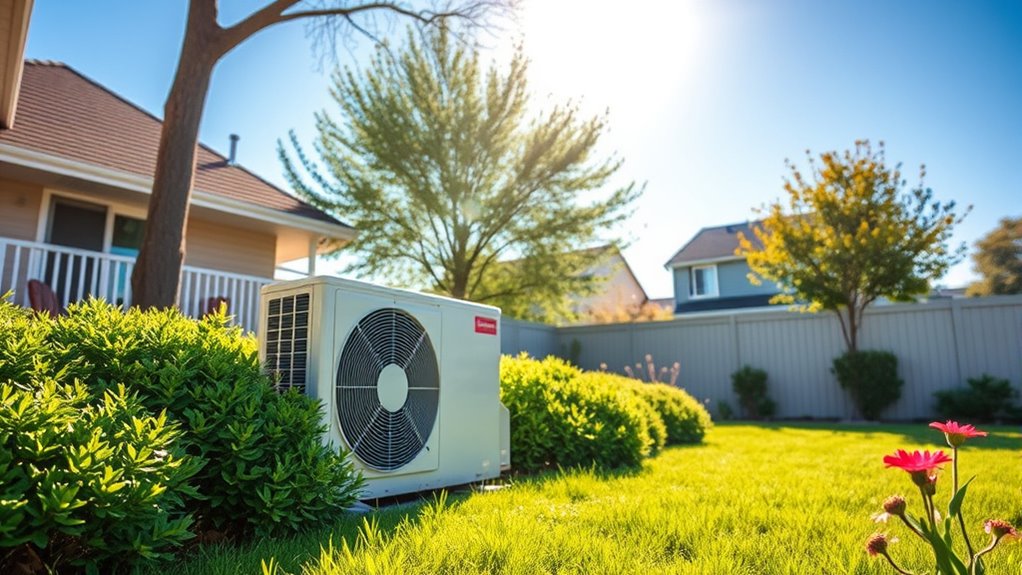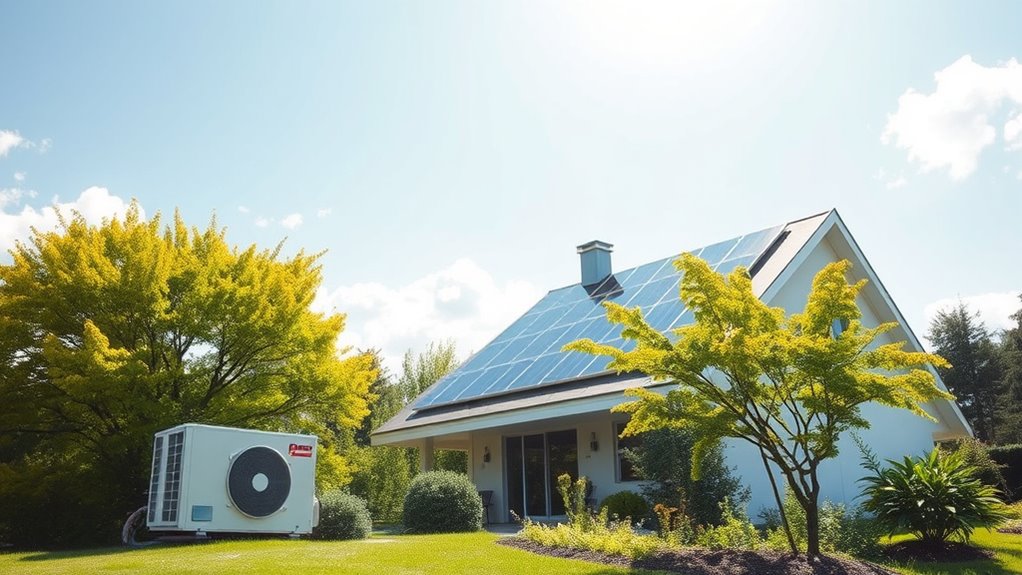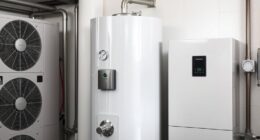Switching to heat pumps helps you cut your home’s energy use, which benefits the environment and saves you money. Because heat pumps transfer heat instead of creating it, they’re much more efficient. This reduces fossil fuel consumption and lowers greenhouse gas emissions. As you adopt heat pumps, your home’s carbon footprint shrinks, supporting cleaner air and a healthier planet. Keep exploring to discover how these systems can make a bigger environmental impact for you.
Key Takeaways
- Heat pumps lower overall energy use, reducing greenhouse gas emissions from electricity generation.
- They enhance integration with renewable energy sources, supporting a cleaner energy grid.
- Reduced energy consumption decreases reliance on fossil fuels, cutting harmful pollutants.
- Increased efficiency helps slow climate change by minimizing carbon footprint.
- Widespread heat pump use promotes investment in sustainable energy infrastructure.

Heat pumps are transforming the way we heat and cool our homes by substantially reducing energy consumption. This shift not only benefits your household’s energy bills but also plays an essential role in advancing renewable integration. Unlike traditional heating and cooling systems that rely heavily on fossil fuels, heat pumps harness electricity to transfer heat, making them more compatible with renewable energy sources like solar and wind. As the grid becomes greener, your heat pump’s operation further lowers your household’s carbon footprint, contributing to a cleaner environment. With increased renewable integration, the environmental advantages of using heat pumps grow even more significant, helping communities transition away from carbon-intensive energy sources.
Heat pumps reduce energy use and support renewable energy integration for a cleaner, greener home environment.
By choosing a heat pump, you actively participate in reducing greenhouse gas emissions. Conventional systems generate substantial carbon footprints due to their dependence on oil, natural gas, or coal. Heat pumps, on the other hand, produce minimal direct emissions because they operate on electricity, which can be generated from renewable sources. This means that every degree of energy you save directly correlates to fewer emissions released into the atmosphere. Over time, this reduction adds up, helping to slow climate change and improve air quality. It’s a straightforward way for you to make a meaningful environmental impact while enjoying reliable comfort in your home.
Additionally, heat pumps contribute to a more sustainable energy ecosystem by supporting the integration of renewables into the power grid. As more households adopt heat pump technology, demand for clean energy increases, encouraging investment in renewable infrastructure. This creates a positive feedback loop where renewable energy becomes more accessible and affordable, further decreasing reliance on fossil fuels. Your decision to install a heat pump not only lowers your immediate energy consumption but also aligns with broader efforts to shift towards a sustainable energy future. It’s about making smarter choices that benefit the environment and foster a resilient, low-carbon energy system.
Furthermore, heat pumps promote energy efficiency, which amplifies their environmental benefits. They transfer heat rather than generate it, meaning they use less energy to produce the same level of heating or cooling. This efficiency reduces overall electricity demand, easing pressure on power plants—especially those burning fossil fuels—and further cuts emissions. As the grid becomes increasingly powered by renewables, your energy-efficient heat pump plays a part in decreasing the carbon footprint associated with home climate control. Incorporating more accurate data about the actual performance of heat pumps can help consumers make informed decisions about their energy use. It’s a simple yet powerful step towards a cleaner, more sustainable environment, demonstrating that reducing energy consumption can have a profound impact on our planet’s health.
Frequently Asked Questions
How Do Heat Pumps Compare to Traditional HVAC Systems Environmentally?
Heat pumps are more environmentally friendly than traditional HVAC systems because they use less energy, leading to lower emissions. By integrating renewable energy sources like solar or wind, you can further reduce your carbon footprint and support emissions reduction. This combination not only helps combat climate change but also makes your home more sustainable. So, switching to a heat pump with renewable integration benefits both your environment and your energy bills.
What Is the Typical Lifespan of a Heat Pump?
A heat pump typically lasts around 10 to 15 years, but with proper maintenance, it can go even further. Think of it as a reliable workhorse—its durability depends on quality and care. You’ll want to contemplate replacement costs when it nears the end of its lifespan, as repairs might not be worth it. Regular check-ups keep your investment running smoothly, saving you money and hassle down the road.
Are Heat Pumps Suitable for All Climates?
Heat pumps are quite versatile and suitable for many climates, thanks to their climate adaptability. However, you might face installation challenges in extremely cold or hot environments, which could require specialized models or additional insulation. If you live in a moderate climate, a standard heat pump works well. For extreme temperatures, consult a professional to find a system suited for your specific climate and to address any installation challenges effectively.
How Much Maintenance Do Heat Pumps Require?
Think of your heat pump like a trusty steed—requiring regular care. You should follow a maintenance schedule that includes cleaning filters, inspecting coils, and checking refrigerant levels. Typically, annual system checks help prevent major repairs. While heat pumps are reliable, occasional system repairs might be needed, especially with age or extreme weather. Proper upkeep keeps your system running efficiently and extends its lifespan, saving you money in the long run.
Can Heat Pumps Be Integrated With Renewable Energy Sources?
Yes, you can integrate heat pumps with renewable energy sources like solar power, boosting your home’s sustainability. By pairing your heat pump with solar panels, you decrease reliance on the grid, fostering greater grid independence. This setup not only cuts your energy costs but also minimizes your carbon footprint. Plus, solar integration guarantees your heat pump runs efficiently, making your home more eco-friendly and resilient to energy price fluctuations.
Conclusion
By choosing heat pumps, you harness the power to protect our planet—like a guardian shielding its home. Every kilowatt you save not only cuts your energy bills but also reduces harmful emissions, making a real difference. Imagine a future where your actions plant seeds of sustainability. So, embrace heat pumps today and become a hero in the fight against climate change—because saving energy is truly saving our world.









